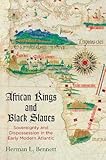African Kings and Black Slaves : Sovereignty and Dispossession in the Early Modern Atlantic / Herman L. Bennett.
Material type: TextSeries: The Early Modern AmericasPublisher: Philadelphia : University of Pennsylvania Press, [2018]Copyright date: ©2018Description: 1 online resource (240 p.)Content type:
TextSeries: The Early Modern AmericasPublisher: Philadelphia : University of Pennsylvania Press, [2018]Copyright date: ©2018Description: 1 online resource (240 p.)Content type: - 9780812295498
- Power (Social sciences) -- Africa, West -- History -- 15th century
- Power (Social sciences) -- Africa, West -- History -- 16th century
- Power (Social sciences) -- Portugal -- History -- 15th century
- Power (Social sciences) -- Portugal -- History -- 16th century
- Slave trade -- Political aspects -- Atlantic Ocean Region -- History -- 15th century
- Slave trade -- Political aspects -- Atlantic Ocean Region -- History -- 16th century
- HISTORY / Renaissance
- African Studies
- African-American Studies
- American History
- American Studies
- European History
- World History
- 306.3/62091821 23
- HT1331 .B46 2019
- online - DeGruyter
| Item type | Current library | Call number | URL | Status | Notes | Barcode | |
|---|---|---|---|---|---|---|---|
 eBook
eBook
|
Biblioteca "Angelicum" Pont. Univ. S.Tommaso d'Aquino Nuvola online | online - DeGruyter (Browse shelf(Opens below)) | Online access | Not for loan (Accesso limitato) | Accesso per gli utenti autorizzati / Access for authorized users | (dgr)9780812295498 |
Frontmatter -- Contents -- Prologue -- Chapter 1. Liberalism -- Chapter 2. Mythologies -- Chapter 3. Law -- Chapter 4. Authority -- Chapter 5. Histories -- Chapter 6. Trade -- Epilogue -- Notes -- Bibliography -- Index -- Acknowledgments
restricted access online access with authorization star
http://purl.org/coar/access_right/c_16ec
As early as 1441, and well before other European countries encountered Africa, small Portuguese and Spanish trading vessels were plying the coast of West Africa, where they conducted business with African kingdoms that possessed significant territory and power. In the process, Iberians developed an understanding of Africa's political landscape in which they recognized specific sovereigns, plotted the extent and nature of their polities, and grouped subjects according to their ruler.In African Kings and Black Slaves, Herman L. Bennett mines the historical archives of Europe and Africa to reinterpret the first century of sustained African-European interaction. These encounters were not simple economic transactions. Rather, according to Bennett, they involved clashing understandings of diplomacy, sovereignty, and politics. Bennett unearths the ways in which Africa's kings required Iberian traders to participate in elaborate diplomatic rituals, establish treaties, and negotiate trade practices with autonomous territories. And he shows how Iberians based their interpretations of African sovereignty on medieval European political precepts grounded in Roman civil and canon law. In the eyes of Iberians, the extent to which Africa's polities conformed to these norms played a significant role in determining who was, and who was not, a sovereign people—a judgment that shaped who could legitimately be enslaved.Through an examination of early modern African-European encounters, African Kings and Black Slaves offers a reappraisal of the dominant depiction of these exchanges as being solely mediated through the slave trade and racial difference. By asking in what manner did Europeans and Africans configure sovereignty, polities, and subject status, Bennett offers a new depiction of the diasporic identities that had implications for slaves' experiences in the Americas.
Mode of access: Internet via World Wide Web.
In English.
Description based on online resource; title from PDF title page (publisher's Web site, viewed 24. Aug 2021)


